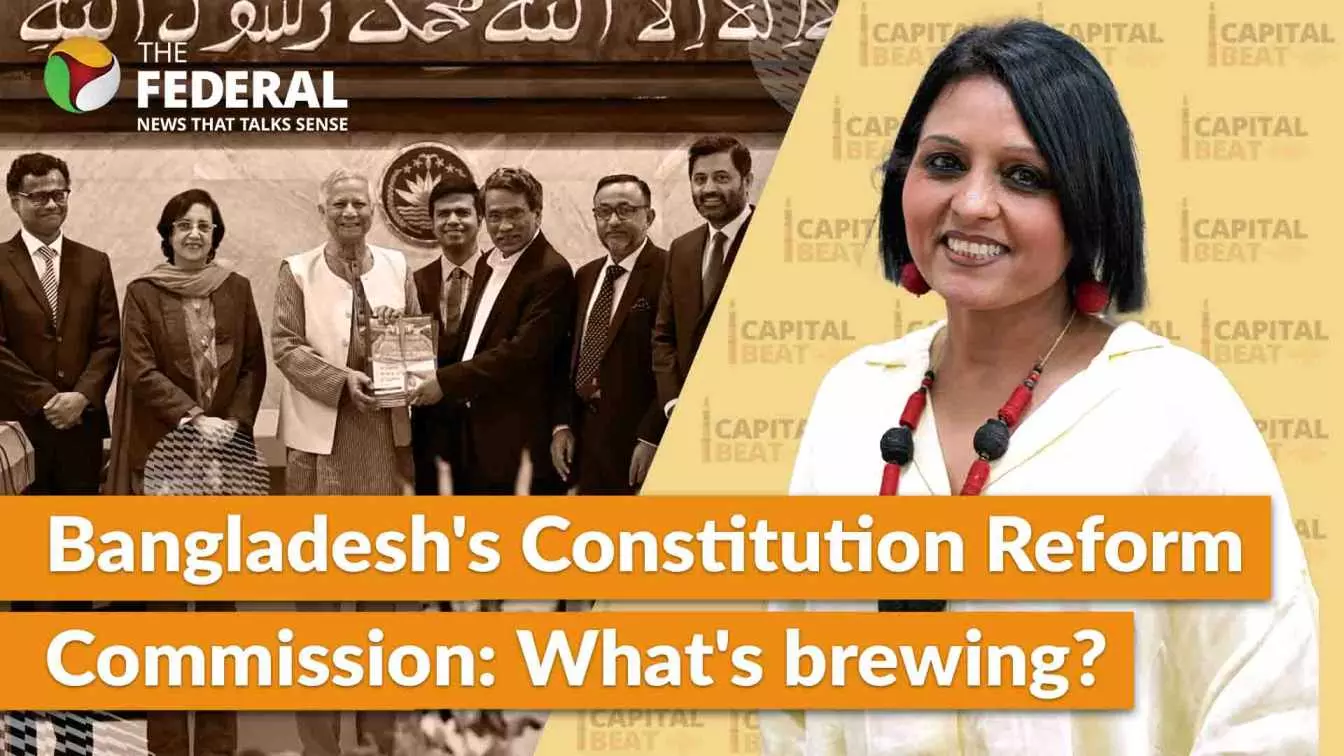
The Capital Beat programme explores latest developments in Bangladesh
Discussion: 'Bangladesh heads for chaos; risky for India'
Bangladesh's reform panel suggests dropping secularism, socialism & nationalism. Is this a real change or just a smokescreen?

This episode of Capital Beat brought together Suhas Chakma, Director of the Rights & Risks Analysis Group, and Sanjay Kapoor, an international affairs expert, to discuss Bangladesh’s controversial Constitution Reforms Commission. Hosted by Neelu Vyas of The Federal, the panel explored the sweeping proposals, including a bicameral parliament, term limits for the Prime Minister, and the removal of key state principles. While the reforms promise democratic restructuring, the panelists expressed skepticism about the government’s intent and ability to deliver meaningful change.
Sweeping Constitutional Reforms
The Constitution Reforms Commission, established by interim government chief Muhammad Yunus, recently proposed significant changes to Bangladesh’s governance structure. These include the removal of secularism, socialism, and nationalism from the country’s fundamental principles, leaving democracy as the sole unchanged value. The Commission also suggested the introduction of a bicameral parliament, with a National Assembly and a Senate, and limiting the Prime Minister’s tenure to two terms.
Also Read: Bangladesh: As BNP drifts away from Yunus govt, what it means for India
Panelist Suhas Chakma criticized these reforms as politically motivated and lacking legitimacy. “These reforms are designed by those in power to extend their rule rather than to benefit the people,” he argued. He emphasized that removing secularism undermines equality for religious minorities, highlighting the challenges of achieving true inclusivity without this principle.
Political Context and Skepticism
Both panelists questioned the interim government’s motives, suggesting that the reforms are a diversionary tactic rather than a sincere attempt at democratic restructuring. Sanjay Kapoor noted, “Muhammad Yunus doesn’t have the mandate to suggest these reforms. His focus should have been on organizing free and fair elections.”
The reforms also drew criticism for being unimplementable under the current framework. Chakma pointed out the absence of a functioning parliament to ratify these proposals. “Without parliamentary approval, these reforms are destined for the dustbin,” he said, emphasizing the interim government’s limited authority.
Public Sentiment and Broader Implications
Public opinion in Bangladesh remains focused on pressing issues like employment and security rather than constitutional changes. According to Chakma, “People want bread and butter, not reforms that have no immediate impact on their lives.” He also warned of potential instability if elections are delayed or manipulated, predicting mass protests led by the Bangladesh Nationalist Party (BNP) and other opposition groups.
Sanjay Kapoor highlighted the regional implications of Bangladesh’s political turmoil, particularly for India. He noted the risks of instability spilling over into neighboring areas, especially with concerns about increased refugee flows and security challenges in the Northeast.
Also Read: Dhaka using communal, anti-India card by arresting Hindu leader 6 mins read
Intentions Under Scrutiny
The panelists criticized Muhammad Yunus’s administration for using the reforms as a smokescreen. Kapoor remarked, “Yunus’s intentions don’t seem noble. This is about prolonging his stay in power, not genuine change.” He also pointed out that the removal of secularism aligns with a broader shift toward authoritarianism in the region.
Conclusion and Outlook
Both panelists agreed that the proposed reforms are unlikely to bring meaningful change unless accompanied by free and fair elections. Chakma warned that failure to address public demands could lead to greater chaos, with potentially severe consequences for Bangladesh and its neighbors.
As the political situation unfolds, the proposed reforms remain a point of contention, reflecting deeper struggles within Bangladesh’s governance and society. Whether these proposals will lead to stability or further unrest remains to be seen.
The content above has been generated using a fine-tuned AI model. To ensure accuracy, quality, and editorial integrity, we employ a Human-In-The-Loop (HITL) process. While AI assists in creating the initial draft, our experienced editorial team carefully reviews, edits, and refines the content before publication. At The Federal, we combine the efficiency of AI with the expertise of human editors to deliver reliable and insightful journalism.

